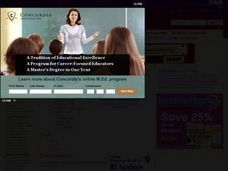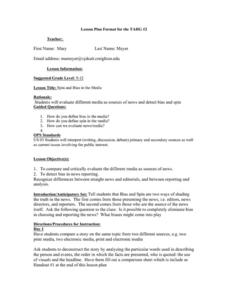Curated OER
Osage, Legend, and Arkansas History
Elementary schoolers evaluate the legend of Norristown Mountain by looking at facts about the Osage Indians and the legend itself. They do an exploration of Arkansas' Native American groups which includes a look at their legends,...
Curated OER
Language Review #7
In this language review #7 worksheet, students edit and punctuate 3 sentences, write fact or opinion for 2 sentences, select words that are spelled correctly and write synonyms for 2 words.
Curated OER
Descriptive Persuasive Texts
In this Language Arts worksheet, students read about persuasive writing. Students read an example and complete a chart that organizes the information into facts and opinions.
Curated OER
What's In the Shopping Bag?
Students explore the techniques used by advertisers to sell toys and snack foods, increase awareness of consumer habits and media influences and differentiate between information and selling.
Curated OER
The Atomic Bomb Dilemma
Students examine consequences of using atomic bomb in light of resulting peace, distinguish between fact and opinion and analyze sources to recognize bias and points of view, and assume role of reporter, critic, cabinet member, or...
Curated OER
Up, Up, and Away
Middle schoolers research hot-ballooning using Internet resources including an around-the-world balloon flight. They determine fact from opinion, examine point of view, and determine main idea, and details. They write a journal entry...
Curated OER
Getting to Know the Candidates: Analyzing Their Campaign Ads
Young scholars examine the role of advertising in presidential campaigns. They analyze one candidate's advertising campaign ads for elements such as major issues, positivity, negativity, facts, and opinions.
Curated OER
Goggle Eyes
In this Google Eyes worksheet, students read eight chapters from Google Eyes and then complete a comprehension exercise, speech marks, persuasive writing, fact and opinion, question mark, and the comma worksheets. Students answer one...
Curated OER
Conducting Research
Third graders conduct research. For this conducting research lesson, 3rd graders discuss the importance of nonfiction text in providing factual information. Students write questions about an assigned topic and research using...
Museum of Tolerance
Developing Media Literacy
To protect young people from questionable content, many schools limit access. This resource suggests that because learners can so readily avail themselves to unrestricted Internet access, it is vital for 21st century...
Facing History and Ourselves
Free Press Makes Democracy Work
A unit study of the importance of a free press in a democracy begins with class members listening to a podcast featuring two journalists, one from a United States public radio station and one from Capetown, South Africa. The lesson,...
Curated OER
Spin and Bias in the Media
Students compare different types of media. In this media comparison instructional activity, students will assess the where all types of media gets its information by viewing a video of a news story and critiquing it.
Curated OER
bbc news: school report
In this journalism worksheet, students choose a subject for a news report. They create a list of three people they would like to interview. They write 3 questions to ask, and indicate if the question relates to a fact or opinion.
Curated OER
Observation
Young scholars study the different kinds of observation: fact and opinion. In this observation lesson students complete an activity that allows them to use their senses to make observations.
Curated OER
HOT TOPICS OF THE MISSISSIPPI
Students use a five-step process to write a persuasive essay about an issue that is related to the Mississippi River. Students build an argument based on prior knowledge and information from a variety of sources. Students base their...
Pennsylvania Department of Education
Stories? Information? What's the Difference?
Students listen to a power point presentation to distinguish between fiction and nonfiction text. In this what's the difference lesson plan, students identify fact from opinion within a text. Students listen critically and respond to text.
Curated OER
Family Life
What is family? Challenge your scholars to write an encompassing definition of what this word means to them. After reading "It May Be a Family Matter, But Just Try to Define Family," class members discuss the emotional issues surrounding...
Curriculum Corner
Editable Exit Tickets
Here is a resource with 28 different exit ticket formats that can be used across the curriculum. Opportunities for exit assessments are endless with various prompts such as, "2 facts I learned today...
Virginia Department of Education
The Writing Process for Persuasive Writing
Get your junior high writers stimulated with the strategies and ideas available in this activity. Learners discuss and debate controversial subjects, and outline their reasons with an online graphic organizer (link included) that creates...
Scholastic
Persausive Writing
A unit on persuasive writing guides elementary learners through the writing process. The first part examines the elements of persuasive writing, including expressing an opinion, connecting ideas, using supporting facts, and writing...
Curated OER
Thesis Statements
At 32 slides, one would think this presentation on thesis statements is a bit too long, but it is the most important component of a well-written essay! Help your developing writers craft concise, interesting theses with this PowerPoint....
Equality and Human Rights Commission
Influencing Attitudes
Does propaganda—like that used during the first World War—exist today? The 11th lesson in a series of 12 highlights the role of media when it comes to influencing attitudes. Scholars learn about sensational headlines, misrepresentation...
EngageNY
TASC Transition Curriculum: Workshop 12
How can opinions slant facts? Workshop participants learn how to examine primary and secondary sources and identify the author's point of view. They also examine how visual art impacts the meaning and rhetoric of sources. Full of...
State Bar of Texas
Tinker v. Des Moines
Freedom of speech allows anyone, even those in school, to say and do what they feel—right? The 1969 Supreme Court case Tinker v. Des Moines serves as the backdrop for a study on First Amendment rights. Scholars use a short video along...
Other popular searches
- Fact Opinion Lesson Plans
- Fact and Opinion Passages
- Fact Opinion Worksheet
- Fact and Opinion Lessons
- Teaching Fact vs. Opinion
- Fact and Opinion Worksheets
- Teaching Fact and Opinion
- Fact and Opinion Games
- Reading Fact and Opinion
- Fact and Opinion Keywords
- Identifying Fact or Opinion
- Fact Opinion Quiz























